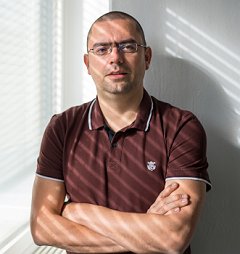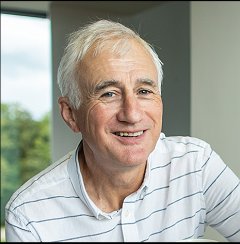Wednesday 18 June Keynote: Prof. Dr. Sven Apel
Saarland University
Title: AI4SE: Adventures in the Promised Land

AI is about to revolutionize how we develop software. In particular, large language models have shown great promise in assisting programmers in writing and reasoning about source code.
In this talk, I will take a step back and reflect on the rich history of AI in software engineering and the manifold ways in which AI can benefit software developers beyond code generation.
In particular, I will share stories on our own adventures in this promised land, as some see it. This includes experiences with using AI for software performance modeling and software model completion as well as discussions on what we can learn from other disciplines in this endeavor.
Bio: Prof. Dr. Sven Apel holds the Chair of Software Engineering at Saarland University & Saarland Informatics Campus, Germany. Prof. Apel received a Ph.D. in Computer Science in 2007 from the University of Magdeburg. His research interests include the development and evaluation of methods, tools, and theories for the construction and analysis of efficient, reliable, maintainable, and configurable software systems. In this endeavor, he pays special attention to the human factor and interdisciplinary research questions. He is the author or co-author of over two hundred peer-reviewed scientific publications. He was PC co-chair of the 31st International Conference on Automated Software Engineering (ASE) and the 27th ACM Joint European Software Engineering Conference and Symposium on the Foundations of Software Engineering (ESEC/FSE). In 2022, he received an ERC Advanced Grant. His work has been funded further by the esteemed Emmy Noether Program and the Heisenberg Program of the German Research Foundation (DFG). In 2018, the Association for Computing Machinery appointed him as ACM Distinguished Member for “Outstanding Scientific Contributions to Computing”. His work has received three Most Influential Paper Awards (SPLC’18, ICPC’22, GPCE’23), three Best Paper Awards (SPLC’11, Modularity’15, AOM’18), two ACM SIGSOFT Distinguished Paper Awards (ICSE’15, ICSE’21), as well as awards by the Ernst Denert Foundation and the Karin Witte Foundation.
Thursday 19 June Keynote: Prof. Dr. Brian Fitzgerald
Lero - the Irish Software Research Centre
Title: The Rise and Rise of InnerSource
 Simply defined, InnerSource refers to the application of the open source software development paradigm within an organisation. Some key benefits that arise through InnerSource include:
Simply defined, InnerSource refers to the application of the open source software development paradigm within an organisation. Some key benefits that arise through InnerSource include:
- Reuse of code in the large, flexible code ownership, large-scale refactoring, and also the sharing of ideas, projects and other artifacts, which can evolve into new products and services.
- Open innovation through collaboration and knowledge-sharing, which can help grow the corporate software engineering capability knowledge base.
Despite these significant benefits, there are also challenges to implementing InnerSource – indeed most InnerSource initiatives have ended in failure. These challenges can be grouped into product, process and organisational factors, with the latter being perhaps the most difficult to address. Software development in large organisations typically takes place in silos with neither opportunity nor incentive to collaborate. The company internal culture and different strategic goals of different business units may affect the uptake of the InnerSource initiative. Success of other business units should not be perceived as a competitive threat. Managers should be encouraged to allow employees to contribute to InnerSource projects throughout the organisation. Also, the motivation of developers to contribute to InnerSource projects needs to be better understood. Issues to do with responsibility of contributors for subsequent maintenance of their code contributions must be clarified and resolved. Organisational reward mechanisms need to be established to recognize InnerSource committers and contributors.
Bio: Brian Fitzgerald was a founding Principal Investigator in Lero–the Irish Software Research Centre in 2005, and subsequently held the roles of Director and Chief Scientist at Lero. He holds an endowed professorship, the Krehbiel Chair in Innovation in Business & Technology, at the University of Limerick, where he also served as Vice President Research. In 2020, he was elected President of the Association for Information Systems, the global body for Information Systems worldwide, and in 2024 he was awarded the LEO Award for outstanding lifetime contribution to the IS discipline. He holds a PhD from the University of London and his research interests lie primarily in software development, encompassing open source, inner source, crowdsourcing, agile and continuous software development. His publications include 17 books, and over 200 peer-reviewed articles in the leading international journals and conferences in both the Information Systems and Software Engineering fields. He has won Best Paper award at ICIS 2000, and was nominated for Best Paper Award at ICIS 2016. He is also General Chair for the premier conferences in both disciplines, the 37th International Conference on Information Systems (ICIS), 2016, and the 49th International Conference on Software Engineering (ICSE), to be held in Dublin in 2027. His research projects have received over €115m in peer-reviewed funding. Prior to taking up an academic position, he worked as a software developer for about 12 years, working in Ireland, Belgium and Germany
Friday 20 June Industry Track Keynote: Dr. Celal Ziftci
Title: Beyond Code Completion: Harnessing LLMs for Complex Code Migrations in an Enterprise Setting at Google
 Large Language Models (LLMs) are rapidly transforming software development, with applications expanding beyond familiar code completion tools. This talk explores the use of LLMs to tackle the challenging and often costly task of code migration within a large enterprise. We will present Google’s experience in developing and deploying LLM-driven solutions to automate complex code changes, including updating APIs, modernizing legacy code, and ensuring consistency across vast codebases.
Large Language Models (LLMs) are rapidly transforming software development, with applications expanding beyond familiar code completion tools. This talk explores the use of LLMs to tackle the challenging and often costly task of code migration within a large enterprise. We will present Google’s experience in developing and deploying LLM-driven solutions to automate complex code changes, including updating APIs, modernizing legacy code, and ensuring consistency across vast codebases.
We will showcase how a combination of LLMs, code analysis, and developer workflows can achieve significant efficiency gains, reducing migration time significantly and enabling the completion of previously intractable projects.
Furthermore, we will discuss practical considerations for adopting LLM-based migration tools, including strategies for prompt engineering, validation and testing, and the crucial role of human oversight in ensuring successful outcomes. By sharing lessons learned and real-world case studies, this talk aims to provide valuable insights for practitioners seeking to leverage the power of LLMs to modernize and maintain large software systems.
Bio: Dr. Celal Ziftci is a seasoned software leader at Google’s New York office with over fourteen years of industry experience. He received his PhD in Computer Science from the University of California, San Diego, and his MSc from the University of Illinois Urbana-Champaign.
His research interests include software development, software testing, software analytics, program analysis, and the application of data mining and machine learning to improve software development processes.
Dr. Ziftci contributed to advancing software development through research and innovation. He has published in leading international conferences on these topics (ICSE’2017, ASE’2023, ICSE’2025), and served on their committees (FSE’2025, ICSE’2024, ICST’2023, ICST’2022).
At Google, Dr. Ziftci is focused on leveraging Generative AI, particularly Large Language Models, to enhance developer productivity and software engineering efficiency, and is committed to driving the adoption of AI and automation to improve software engineering practices.